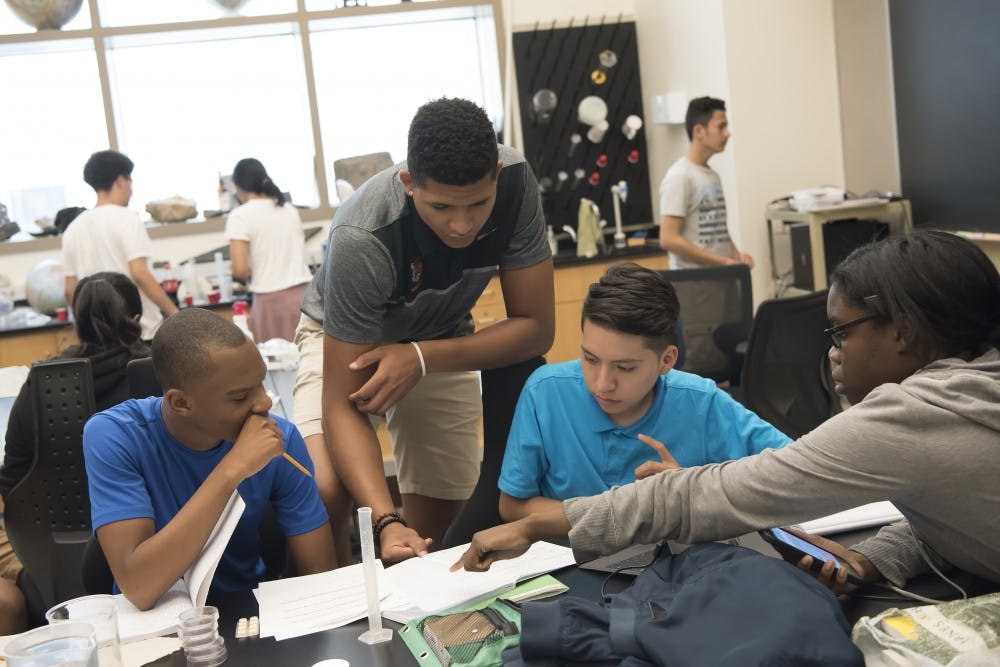The Princeton University Preparatory Program (PUPP), founded in 2001, has helped approximately 400 low-income students in New Jersey gain admission to universities like Princeton, Columbia University, or Stanford.
A tuition-free program sponsored by the Office of the Dean of the College, PUPP provides academic guidance and advising in the college application process for low-income students throughout their high school careers.
The program currently supports six disadvantaged public high schools in Mercer County, New Jersey: Ewing High School, Trenton Central High School, Princeton High School, Trenton High School West, Lawrence High School, and Nottingham High School.
According to a 2017 NPR report, low-income students make up only 3 percent of the enrollment in elite colleges across the country. For reference, a family of four in New Jersey that earns below $68,000 annually qualifies as “low-income.” According to the same report, 25 percent of these same students complete college applications alone with no assistance.
“[Students] may have a calculus class with no teacher, a guidance counselor that is ill-informed about financial aid, or any number of difficult family situations,” said QuinnShauna Felder-Snipes, the program’s assistant director for college counseling and scholar development.
PUPP’s curriculum includes academic courses, personal development workshops, and cultural excursions to theatrical productions, museums, and historical sites, Tieisha Tift, a PUPP program associate and program alumna, explained in an email statement to The Daily Princetonian.
“We want to make sure that no one falls through the cracks,” wrote Tift.
The rigorous selection process is primarily based on state assessment scores, honor roll status, and whether the student’s annual gross family income is below $55,000.

The program consists of “weekly enrichment sessions that focus on helping them prepare their collaboration, presentation, listening and debating skills.”
The program’s summer session, however, is even more rigorous. Fedjine Victor ’22, a PUPP scholar from Hamilton, N.J., explained that students would attend “college-like” classes in writing, math, literature, or social science during the six-week program.
The ultimate hope is that students not only receive admissions to their top-choice college, but that they also develop skills that they can continue to use throughout their undergraduate careers, said PUPP director Jason Klugman.
Victor said that she never thought she would have the opportunity to attend a top university like Princeton.

“I was not thinking too much about getting into a top school,” said Victor. “I was more concerned about being accepted into a college.”
The program has been successful thus far.
PUPP reports that their students are among the top 10 percent of their high school classes. In addition, 72 percent of PUPP scholars pursued and earned their college degree among the first 10 cohorts of the program, according to PUPP’s website.
Five separate reports by Educational Testing Service, an international nonprofit organization which researches educational policy and assesses success, concluded that PUPP increased students’ knowledge of the college application process, broadened their pool of target colleges, and exposed them to new arts and cultural experiences.
Although PUPP has resources and success stories to offer, Victor’s classmates barely knew the program existed. Instead, college preparation for her classmates meant only preparing for the SAT, Victor explained.
Because of awareness concerns like Victor’s, PUPP administration has expressed interest in expanding its outreach.
According to Felder-Snipes, the program would be thrilled to have additional resources like case managers that help connect the scholars and their families to social service organizations in their communities.
PUPP alumni associate Leslie Castrejon also suggested that the program creates professional networking, support with the graduate school admissions process, and even social connections across cohorts to increase its outreach.
“We continue to consider ways to better support the emotional well-being of our scholars and their families,” said Felder-Snipes.
Eleven PUPP alumni are current undergraduates, one is a graduate, and five are employed by the campus, according to Felder-Snipes.
If PUPP scholars choose to matriculate onto campus, they can utilize Princeton’s Freshman Scholars Institute (FSI) and Scholars Institute Fellow Program (SIFP), designed to assist low-income students with their journey through Princeton.
However, PUPP support extends beyond graduation.
Castrejon said that students all across the country can still count on PUPP for assistance.
“What’s great is working in collaboration with the SIFP folks to think about [what] we can do for … PUPP alumni that attend schools as close as TCNJ and as far away as Occidental College in Los Angeles,” Castrejon said.
Students have expressed gratitude for the success that PUPP has already achieved.
“I am so grateful for the resources and help PUPP has provided me for the past three years,” Betsy Vasquez ’20 said. “If I could repeat the process again, I would. I wish every motivated, low-income, high-achieving student had the opportunity to be in a program like PUPP.”








